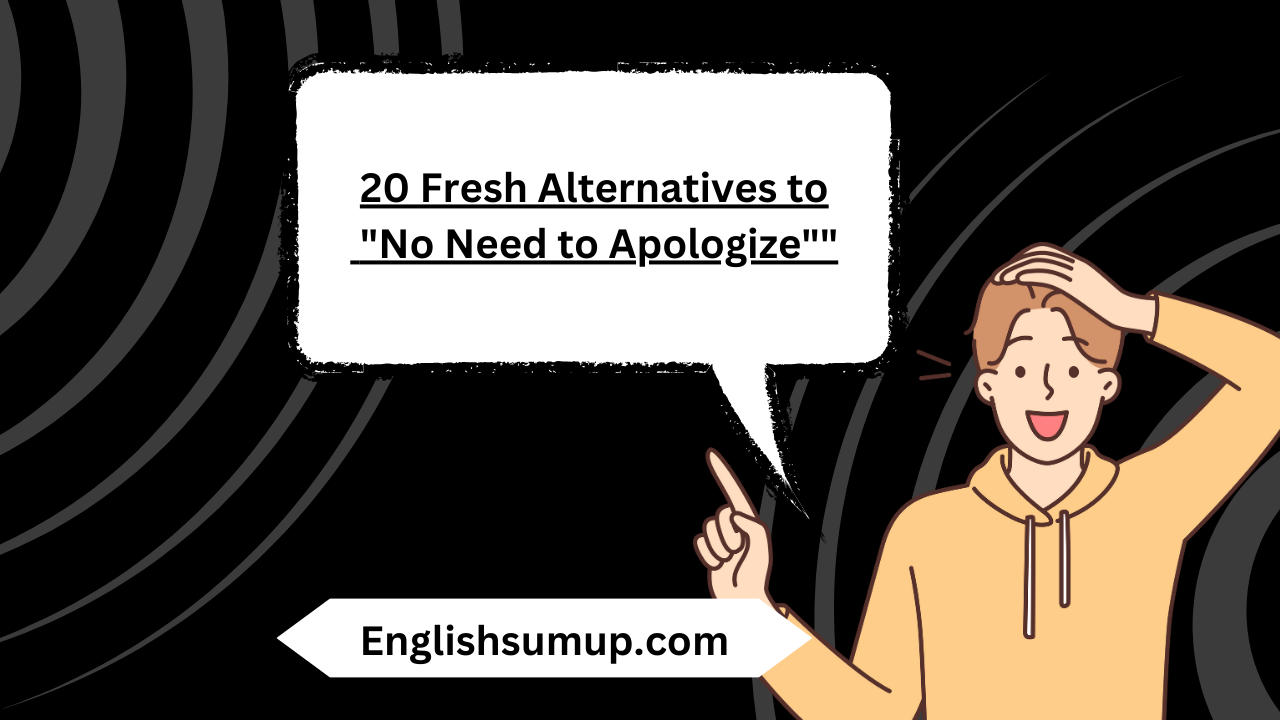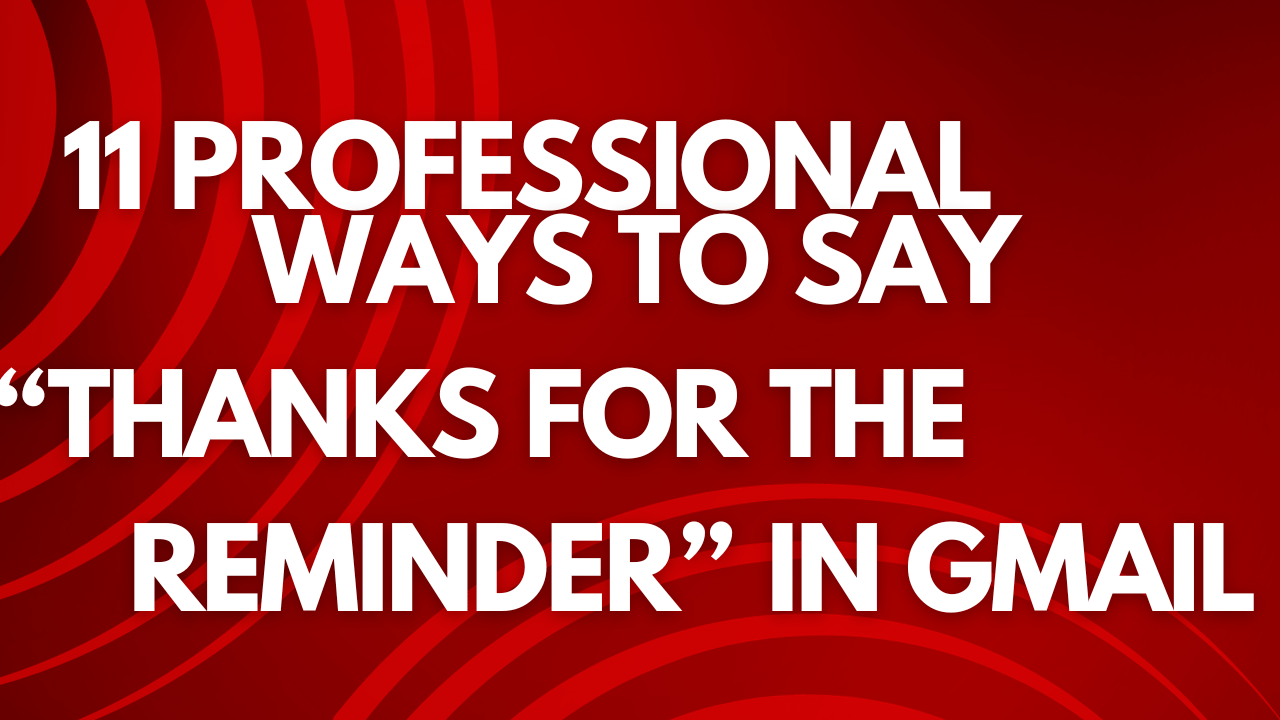In our daily interactions, the phrase “no need to apologize” often serves as a polite acknowledgment of someone’s concern or regret. However, relying solely on this expression can limit the richness of our language. In this article, we’ll explore 20 alternative ways to convey the same sentiment, discussing the importance of diversifying our vocabulary, the pros and cons of each phrase, and providing examples to illustrate their usage.
Why Expand Your Vocabulary?
Language is a powerful tool for communication, shaping how we express ourselves and connect with others. By expanding our vocabulary, we enhance our ability to convey nuance and complexity in our interactions. Using a diverse range of expressions allows us to tailor our responses to different situations and audiences, fostering clearer and more effective communication.
You May Love this One: 20 Alternative Phrases for “I Was Wondering”
While using alternative phrases for “no need to apologize” offers several advantages, it’s essential to consider the context and tone of the conversation. Here are some pros and cons to keep in mind:
Pros:
Variety: Using a diverse range of expressions adds richness and depth to your language, making your communication more engaging and memorable.
Precision: Alternative phrases may convey nuances of meaning that “no need to apologize” does not, allowing for clearer and more nuanced communication.
Versatility: Having multiple ways to express the same sentiment allows you to tailor your response to different situations and audiences, increasing the effectiveness of your communication.
Cons:
Misinterpretation: Some phrases may not convey the same level of politeness or sincerity as “no need to apologize,” potentially leading to misunderstandings.
Complexity: Using overly formal or unfamiliar expressions may confuse your audience, detracting from the clarity of your message.
Overuse: Employing too many alternative phrases in quick succession may come across as artificial or insincere, diminishing the authenticity of your communication.
List of Synonyms for “No Need to Apologize”
- No worries.
- It’s fine.
- No problem.
- Don’t mention it.
- It’s all good.
- No need.
- It’s okay.
- No trouble at all.
- No harm done.
- All good
- It’s nothing.
- You’re forgiven.
- It’s all right.
- No need for apologies.
- It’s all forgiven.
- No need to feel bad.
- There’s no need.
- It’s perfectly fine.
- You’re excused.
- You’re forgiven.
No worries:
“No worries” is a friendly and casual way to reassure someone that their apology is unnecessary. This phrase implies that the situation is not a cause for concern and that the speaker harbors no ill feelings towards the individual. It fosters a sense of understanding and forgiveness, allowing the conversation to continue without dwelling on the issue.
Email Example:
Subject: Re: Late Arrival
Hi John,
No need to apologize for being late. No worries at all. Life happens, and we understand that unexpected delays occur. Let’s get started with the meeting and make the most of our time together.
Best regards,
Devon
It’s fine:
“It’s fine” communicates that the situation is acceptable and there’s no need for concern or apology. This phrase suggests that the speaker does not perceive any negative consequences resulting from the action or event. It reassures the recipient that their actions are not causing any undue harm or inconvenience.
Email Example:
Subject: Re: Missed Deadline
Hi John,
No need to apologize for missing the deadline. It’s fine. We understand that unforeseen circumstances can arise, and we’re confident that we can adjust our plans accordingly. Let’s work together to ensure we meet the next one.
Regards,
Devon
No problem:
“No problem” reassures the recipient that their actions have not caused any inconvenience and there’s no need for an apology. This phrase conveys a sense of understanding and acceptance, implying that the speaker harbors no resentment or ill will towards the individual. It emphasizes that the situation is not a cause for concern or worry.
Email Example:
Subject: Re: Spelling Error
Hi John,
No need to apologize for the spelling error. No problem at all. Mistakes happen, and what’s important is that we address them and move forward. Let’s correct it before finalizing the document to ensure accuracy.
Regards,
Devon
Don’t mention it:
“Don’t mention it” suggests that the action or situation is trivial and does not require acknowledgment or apology.This phrase implies that the speaker does not view the issue as significant and wishes to downplay its importance. It conveys a sense of reassurance and acceptance, allowing the conversation to move forward without dwelling on the matter.
Email Example:
Subject: Re: Late RSVP
Hi John,
No need to apologize for the late RSVP. Don’t mention it. We’re delighted that you’ll be able to join us, and we look forward to seeing you at the event. Your presence is what matters most.
Best regards,
Devon
It’s all good:
“It’s all good” conveys that everything is satisfactory and there’s no need for further discussion or apology. This phrase suggests that the speaker does not perceive any negative consequences resulting from the action or event. It fosters a sense of reassurance and acceptance, allowing the conversation to proceed without dwelling on the issue.
Email Example:
Subject: Re: Missed Call
Hi John,
No need to apologize for the missed call. It’s all good. We understand that you have a busy schedule, and we’re here whenever you’re ready to connect. Feel free to reach out whenever you have a moment.
Regards,
Devon
No need:
“No need” succinctly conveys that an apology is unnecessary. This phrase implies that the recipient’s concern or regret is unwarranted, as the situation is not perceived as requiring an apology. It reassures the individual that their actions are not causing any harm or inconvenience.
Email Example:
Subject: Re: Delayed Response
Hi John,
No need to apologize for the delayed response. No need. Your message reached me just fine, and I appreciate you taking the time to get back to me. Let’s proceed with our discussion.
Regards,
Devon
It’s okay:
“It’s okay” communicates that the situation is acceptable and there’s no need for concern or apology. This phrase conveys a sense of reassurance and acceptance, indicating that the speaker does not perceive any negative consequences resulting from the action or event.
Email Example:
Subject: Re: Forgot to Attach File
Hi John,
No need to apologize for forgetting to attach the file. It’s okay. These things happen, and we can easily rectify the situation. Please resend it when you get a chance.
Best regards,
Devon
No trouble at all:
“No trouble at all” reassures the recipient that their actions have not caused any inconvenience or trouble. This phrase conveys a sense of understanding and forgiveness, indicating that the speaker harbors no ill feelings towards the individual.
Email Example:
Subject: Re: Missed Appointment
Hi John,
No need to apologize for missing the appointment. No trouble at all. I understand that unforeseen circumstances can arise, and there’s no need to worry about it. Let’s reschedule for a time that works better for you.
Regards,
Devon
No harm done:
“No harm done” suggests that the situation has not resulted in any negative consequences and there’s no need for an apology. This phrase conveys a sense of reassurance and acceptance, indicating that the speaker does not perceive any harm or damage caused by the action or event.
Email Example:
Subject: Re: Spilled Coffee
Hi John,
No need to apologize for the spilled coffee. No harm done. It was just an accident, and there’s no need to worry about it. Let’s clean it up together and move on with our day.
Best regards,
Devon
All good:
“All good” conveys that everything is satisfactory and there’s no need for further discussion or apology. This phrase suggests that the speaker does not perceive any negative consequences resulting from the action or event, and everything is as it should be.
Email Example:
Subject: Re: Forgot to Call
Hi John,
No need to apologize for forgetting to call. All good. I understand that you have a lot on your plate, and it’s no problem at all. Feel free to reach out whenever you have a moment.
Regards,
Devon
It’s nothing:
“It’s nothing” minimizes the significance of the situation, suggesting that the action or event in question is inconsequential and does not warrant an apology. This phrase conveys a sense of reassurance and acceptance, indicating that the speaker does not perceive any harm or inconvenience caused.
Email Example:
Subject: Re: Delayed Response
Hi John,
No need to apologize for the delayed response. It’s nothing. I understand that you have other commitments, and there’s no rush. Let’s continue our conversation when you have the time.
Best regards,
Devon
You’re forgiven:
“You’re forgiven” conveys forgiveness and understanding, indicating that the speaker harbors no ill will towards the individual for their actions. This phrase emphasizes reconciliation and moving forward without dwelling on past mistakes.
Email Example:
Subject: Re: Forgot to Submit Report
Hi John,
No need to apologize for forgetting to submit the report. You’re forgiven. Mistakes happen, and what’s important is that we learn from them. Let’s work together to ensure it’s submitted by the new deadline.
Regards,
Devon
It’s all right:
“It’s all right” reassures the recipient that the situation is acceptable and there’s no need for concern or apology. This phrase conveys a sense of understanding and acceptance, indicating that the speaker does not perceive any negative consequences resulting from the action or event.
Email Example:
Subject: Re: Missed Meeting
Hi John,
No need to apologize for missing the meeting. It’s all right. We understand that things come up unexpectedly, and there’s no need to worry about it. Let’s catch up at our next scheduled meeting.
Best regards,
Devon
No need for apologies:
“No need for apologies” suggests that the recipient’s concern or regret is unwarranted, as the situation is not perceived as requiring an apology. This phrase emphasizes that the speaker does not hold any blame or resentment towards the individual for their actions.
Email Example:
Subject: Re: Spelling Error
Hi John,
No need for apologies for the spelling error. It happens to the best of us. Let’s correct it before finalizing the document to ensure accuracy.
Regards,
Devon
It’s all forgiven:
“It’s all forgiven” conveys forgiveness and understanding, indicating that the speaker harbors no ill will towards the individual for their actions. This phrase emphasizes reconciliation and moving forward without dwelling on past mistakes.
Email Example:
Subject: Re: Forgot to Return Call
Hi John,
No need to apologize for forgetting to return the call. It’s all forgiven. Let’s continue our conversation and focus on moving forward.
Best regards,
Devon
No need to feel bad:
“No need to feel bad” reassures the recipient that there’s no reason for them to experience guilt or regret over the situation. This phrase conveys empathy and understanding, indicating that the speaker does not wish for the individual to dwell on their mistake.
Email Example:
Subject: Re: Forgot to Send Invitation
Hi John,
No need to feel bad for forgetting to send the invitation. It’s understandable given your busy schedule. Let’s make sure to send it out as soon as possible and move forward with our plans.
Regards,
Devon
There’s no need:
“There’s no need” succinctly conveys that an apology is unnecessary. This phrase implies that the recipient’s concern or regret is unwarranted, as the situation is not perceived as requiring an apology. It reassures the individual that their actions are not causing any harm or inconvenience.
Email Example:
Subject: Re: Missed Deadline
Hi John,
There’s no need to apologize for missing the deadline. I understand that unexpected circumstances can arise, and we can adjust our plans accordingly. Let’s work together to ensure we meet the next deadline.
Regards,
Devon
It’s perfectly fine:
“It’s perfectly fine” communicates that the situation is completely acceptable, and there’s no need for concern or apology. This phrase conveys a sense of reassurance and acceptance, indicating that the speaker does not perceive any negative consequences resulting from the action or event.
Email Example:
Subject: Re: Delayed Response
Hi John,
No need to apologize for the delayed response. It’s perfectly fine. We understand that you have other priorities, and we appreciate you getting back to us when you can.
Best regards,
Devon
You’re excused:
“You’re excused” conveys forgiveness and understanding, indicating that the speaker holds no ill will towards the individual for their actions. This phrase emphasizes that the individual is not held responsible or accountable for the situation.
Email Example:
Subject: Re: Forgot to Inform
Hi John,
No need to apologize for forgetting to inform us. You’re excused. We understand that oversights happen, and we appreciate your honesty. Let’s make sure to stay in communication moving forward.
Regards,
Devon
You’re forgiven:
“You’re forgiven” conveys forgiveness and understanding, indicating that the speaker harbors no ill will towards the individual for their actions. This phrase emphasizes reconciliation and moving forward without dwelling on past mistakes.
Email Example:
Subject: Re: Late Submission
Hi John,
No need to apologize for the late submission. You’re forgiven. Let’s focus on finding a solution together and ensuring we meet our objectives moving forward.
Regards,
Devon
You May Love this One: 20 Professional Ways to Say “I Appreciate It”
Conclusion:
Expanding your repertoire of expressions for “No Need to Apologize” offers numerous benefits in enhancing communication and fostering positive interactions. By incorporating a diverse range of phrases such as “No worries,” “It’s fine,” and “You’re forgiven,” individuals can effectively convey reassurance, understanding, and forgiveness in various contexts.
Diversifying your vocabulary not only enriches your language skills but also allows for more nuanced and tailored communication. Each alternative phrase offers a unique tone and emphasis, providing flexibility in conveying your message with sincerity and clarity.










